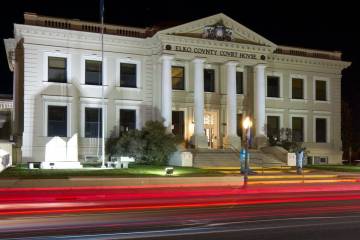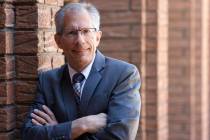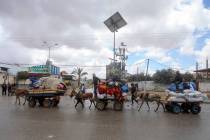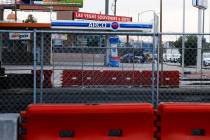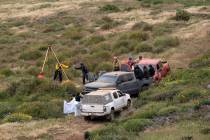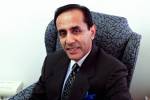Eighth hepatitis C case surfaces
An eighth case of hepatitis C linked to a Las Vegas endoscopy center.
A police investigation hampered by a massive amount of paperwork.
Inaccessible patient records and a lack of cooperation by physicians who worked at clinics.
In Nevada's health crisis, lawmakers at a Monday committee meeting heard these unsettling developments, which were summed up in a few words by Brian Labus, the Southern Nevada Health District's senior epidemiologist.
"We have a lot of things working against us."
The newest acute hepatitis C case was linked to the Endoscopy Center of Southern Nevada's clinic at 700 Shadow Lane. The individual who contracted the disease underwent a procedure at the facility in June 2005 and developed symptoms within nine weeks, Labus said. The case was never reported to the health district, a requirement under Nevada law.
The Shadow Lane facility is at the heart of the health crisis, which caused officials to send warnings to 40,000 people to be tested for hepatitis strains and HIV.
After Labus' report, the Legislative Committee on Health Care received disturbing news from other health agencies and law enforcement about what has slowed their investigations into the hepatitis C outbreak and who is responsible for the infections.
Members of the Metropolitan Police Department's organized crime bureau told lawmakers they are moving forward with a criminal investigation despite the task of sifting through 2,000 boxes of medical records.
Capt. Al Salinas said authorities seized medical files at six gastroenterology centers associated with Dr. Dipak Desai after receiving an anonymous tip that the records were going to be destroyed at the facilities.
The Police Department plans to hire a medical management company later this week to categorize patient records.
"It's been difficult to say the least,'' Salinas told the committee, which met at the Sawyer Building. "The issue is that we're not in the business of distributing medical records.''
Desai, a gastroenterologist, is majority owner of the Shadow Lane facility where health officials think seven people contracted acute hepatitis C because of unsafe injection practices by nurse anesthetists. The other hepatitis C case is linked to the Desert Shadow Endoscopy Center, 4275 Burnham Ave., which is partially owned by Desai.
Each of the facilities was closed in March when local governments pulled business licenses.
Police have received more than 1,400 requests from patients and attorneys for medical records. Those that have been sorted are prioritized based on medical necessity, Salinas said.
About 50 records have been distributed in the past two weeks, and another 30 will be released this week.
"This is very costly, and funding is an issue, but the sheriff has made the decision to move forward with this,'' Salinas said. "The delay in the process has been long and, unfortunately through legal reasons, we were told that no other agency could enter into a contract with the management company. So it fell back in our laps.''
Labus said the health district's overall investigation has been challenged because records are inaccessible.
He said that the health district has had a difficult time questioning patients because it received an incomplete patient list from the endoscopy center's staff and that the business didn't keep proper records.
Assemblywoman Sheila Leslie, D-Reno, asked Labus whether the health district plans to send notifications to patients of the Burnham facility.
"It certainly seems the people on that day are at risk,'' Leslie said, referring to a patient who underwent a procedure there on June 14, 2006, and became ill several weeks later.
Labus said that those records were in the hands of police and that once the health district has access to them, it might be able to determine whether notifications are needed.
"There is the potential that many more thousands of people might need to undergo testing,'' Labus told Leslie.
Tony Clark, executive director of the state's Board of Medical Examiners, told the committee that its own investigation has been hampered because of a lack of information. Physicians who worked within Desai's gastroenterology group were refusing to answer questions, he said.
"The doctors were advised by their attorneys not to give us a statement,'' Clark said. "The certified nurse anesthetists are saying the same thing.''
Sen. Steven Horsford, D-Las Vegas, asked what methods Clark and his staff had taken to get affidavits from the nurses and physicians. Clark said the requests were verbal.
Horsford said that "verbal alone is not sufficient" and that Clark should get their refusals to cooperate in writing.
"It is very disturbing that these doctors are out there practicing as if nothing has happened,'' he said.
Desai has voluntarily agreed not to practice medicine in Nevada.
Later, Horsford said he thought the medical board has been negligent in its role in protecting the public and that it needs to be restructured.
Committee members were receptive to ideas that would strengthen oversight of ambulatory surgery centers, overhaul the state's licensing bureau, expand the authority of health departments during outbreaks and restructure appointments to medical regulatory boards.
Assemblyman Joe Hardy, R-Boulder City, suggested the state, to avoid any potential or perceived conflicts of interest, get away from having medical board members be political appointees.
Currently, members of the medical board are appointed by the governor.
Three medical board members, including its president, have had to recuse themselves from proceedings regarding the hepatitis C outbreak because they have personal or business relationships with Desai.
The committee also heard testimony from three national accrediting organizations about oversight of ambulatory surgery centers. Accreditation is not a requirement of ambulatory surgery centers in Nevada. Some lawmakers have suggested it should be.
Of the 50 ambulatory surgery centers in Nevada, 32 are accredited by the Accreditation of Ambulatory Surgery Facilities, Accreditation Association for Ambulatory Health Care or the Joint Commission.
The Shadow Lane facility was accredited by the Association for Ambulatory Health Care up until early March, said Carolyn Kurtz, senior counsel and director of government affairs.
Kurtz said the center's accreditation has been revoked.
She told the committee the agency also accredited the Desert Shadow facility and is analyzing the results of its investigation into that facility.
Dr. Rudi Manthei, an ophthalmologist who is a member of the state's Ambulatory Surgery Association, pitched mandatory accreditation for such facilities. He went a step further and said the ambulatory surgery centers, as well as accrediting agencies, should be required to report loss of accreditation immediately to the state.
Manthei announced last week interest in buying two of three clinics owned by Desai.
The health district also proposed several suggestions to protect the public.
One would be to allow a health district's chief health officer to issue a "cease and desist order" for medical facilities or medical care providers in cases in which unsafe medical practices are discovered and other agencies defer action or don't have the authority to act.
The response to Nevada's hepatitis C outbreak has led to criticism that some regulatory agencies didn't act quickly enough to shut down facilities or stop physicians from practicing medicine.
Other policy recommendations by health district officials included the following:
•Expanding provisions to allow investigative agencies to share information.
•Allowing penalties for violations by medical facilities to include investigative costs as well as costs related to responding to an exposure or outbreak.
•Creating an ombudsman position within the Nevada State Health Division to assist the public in filing complaints against a facility or health care professional.
Contact reporter Annette Wells at awells@reviewjournal.com or 702-383-0283.






